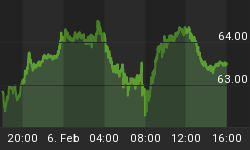Spanish and Italian bond yields have now risen back up to the level they were before the EU Summit. We also learned recently that U.S. job growth remains anemic, producing just 80k net new jobs in June. The global manufacturing index dropped to 48.9, for the first time since 2009. And emerging market economies have seen their growth rates tumble, as the European economy sinks further into recession.
It isn't much of a surprise to learn that central banks in China, Britain, Europe and America have indicated that more money printing is just around the corner.
In fact, we have recently witnessed the People's Bank of China cut their one-year lending rate by 31 bps to 6 percent. The European Central Bank cut rates 25 bps, to .75 percent and dropped their deposit rate to 0 percent. And the Bank of England restarted their bond purchase program just two months after ending the previous program, which indicates the central bank will buy another 50 billion pounds of government debt.
This past Non-farm payroll report in the U.S. virtually guarantees the Fed will take action to compel commercial banks into expanding loan output within the next few months. It would be unrealistic to believe Ben Bernanke would watch U.S. inflation rates fall, the major averages significantly decline, employment growth stagnate; and do nothing to increase the money supply--especially while his foreign counterparts are aggressively easing monetary policy and trying to lower the value of their currencies.
As I predicted as far back as June of 2010, the Fed will soon follow the strategy of ceasing to pay interest on excess reserves. Since October 2008, the Fed has been paying interest (25 bps) on commercial bank deposits held with the central bank. But because of Bernanke's fears of deflation, he will eventually opt to do whatever it takes to get the money supply to increase. With rates already at zero percent and the Fed's balance sheet already at an unprecedented and intractable level, the next logical step in Bernanke's mind is to remove the impetus on the part of banks to keep their excess reserves laying fallow at the Fed. Heck, he may even charge interest on these deposits in order to guarantee that banks will find a way to get that money out the door.
The move would be much more politically tenable than to increase the Fed's balance sheet yet further, most likely because people don't understand the inflationary impact it would have. Ceasing to pay interest on excess reserves would allow the Fed to lower the value of the dollar and vastly increase the amount of loan creation, without the Fed having to create one new dollar.
If commercial banks stop getting paid to keep their money dormant at the Fed, they will surely find somebody to make a loan to. They may even start shoving loans out through the drive-up window with a lollipop. Banks need to make money on their deposits (liabilities). If banks no longer get paid by the Fed, they will be forced to take a chance on loans to consumers, at the exact time when they should be getting rid of their existing debt. But it has already been made very clear to them that the government stands ready to bail out banks. So in reality, they don't have to worry very much at all about once again making loans to people that can't pay them back.
Commercial banks currently hold $1.42 trillion worth of excess reserves with the central bank. If that money were to be suddenly released, it could through the fractional reserve system, have the potential to increase the money supply by north of $15 trillion! As silly as that sounds, I still hear prominent economists like Jeremy Siegel call for just such action. If they get their wish, watch for the gold market to explode higher in price, as the U.S. dollar sinks into the abyss.















